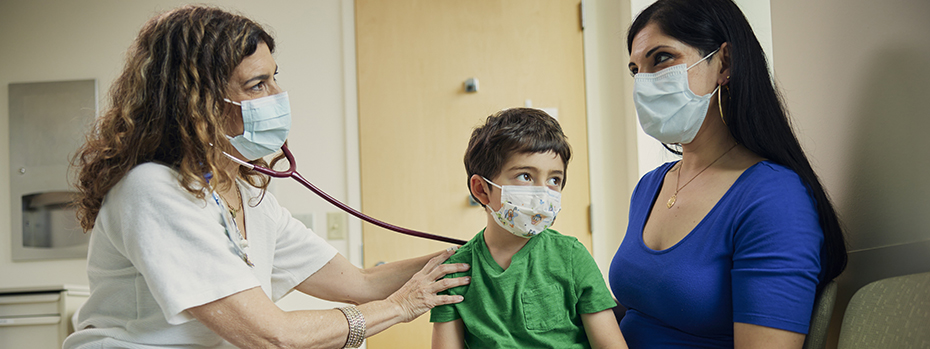What to Expect from the Craniofacial Program

At OHSU Doernbecher Children’s Hospital, we know it can be stressful to learn that your child has a craniofacial condition. These conditions can affect your child’s appearance. We know that unusual facial features may change how we see ourselves and how others see us.
Craniofacial conditions also affect your child’s health. Many conditions take years to treat. Children may have trouble with speech, hearing, vision and eating.
You can expect:
- Access to experts in 16 medical specialties to give your child the best possible care.
- Care and treatment tailored to fit your family’s needs.
- Long-term, supportive relationships with your child’s care team, often from infancy to adulthood.
Mapping a treatment plan
Most craniofacial patients come to Doernbecher after referral from a pediatrician or prenatal care provider. We may start seeing you before your child’s birth, in the days after birth, or later. Who you see and when will depend on your child’s condition.
Your family may meet with:
- A team of specialists who will examine your child and discuss treatment options with you.
- A care coordinator who will answer your questions and help with scheduling.
- A social worker, who can help you find community resources and provide support.
Your child’s care team will map out a detailed treatment plan that starts right away. If the plan includes surgery, it will likely be during your child’s first year. Early treatment for craniofacial conditions that cause speech or hearing issues is important because changing speech patterns is more difficult for older children and teenagers.
Treatments
Nonsurgical treatment
We provide a full range of treatments to help with any craniofacial condition. Many conditions can be treated with changes in routine or with orthodontic aids. For example:
- If your child’s head shape is uneven, treatment could be as simple as repositioning their head when they sleep.
- If your infant has a lip tie, treatment may include a mouth plate that looks like a dental retainer to guide the growth of the lips and gums.
Surgery
If your child’s treatment plan includes surgery, we will work with you to choose the right timing. We usually schedule surgery for cleft lip three to five months after birth. We schedule surgery for cleft palate and other craniofacial conditions within the first year.
Conditions that affect the bones of the skull, the jaw, or facial features may be best treated with more than one surgery. Some children may need multiple surgeries into their teen or young adult years. Our team has the most experience in Oregon at these complex surgeries.
Monitoring
At Doernbecher, we build ongoing relationships with you and your child. Many families also meet through our clinics and support each other. Our team will:
- Schedule follow-up visits every 6-12 months for as long as your child needs them.
- Check in with you to make sure your child’s treatment plan is working.
- Take a long-term view, recommending support services, treatments and follow-up surgeries as needed.
Frequently asked questions
Are there genetic tests to screen for cleft lip or cleft palate?
There are no tests that can detect the genes responsible for cleft lip or cleft palate. But a family history of cleft lip or cleft palate increases the chance that your child will have the condition.
Our genetics experts can help evaluate your child’s risk for many conditions based on your family history, blood tests and other indicators.
If my child doesn’t pass a hearing test, are they likely to always have trouble hearing or speaking?
If the hearing test signals a potential issue, we will work to find the cause. There are many reasons your child may not pass a hearing test. It may be as simple as a temporary build-up of fluid in the middle ear.
Some children with a cleft palate do have hearing loss or speech delays, so we monitor patients closely. Some problems may be best treated with surgery, but many can be treated with speech therapy.
How much dental work will my child with a cleft need?
Children with clefts may have less enamel on their teeth. This means that early and daily dental hygiene is very important to prevent tooth decay.
As far as orthodontia or dental surgery, your child’s needs depend on how severe their cleft is. We will work with you and your child to create a long-term orthodontics plan.
For mild cases, some children need no special dental care. Others may need braces like many other teenagers.
For severe cases, children may need jaw surgery, or a bone graft so that an adult tooth can come through the gums.
Will my child be teased or bullied because of a scar from a cleft lip or an unusual facial feature?
Your child is likely to be asked questions about a visible facial scar. Unfortunately, some of their peers might tease or bully your child. Many children with lip repairs or unusual facial features cope easily, but others struggle to cope with their physical differences.
You can guide your child on how to respond to questions and comments, whether they are well-intentioned or unkind. Doernbecher’s pediatric psychologist can help you and your child navigate these issues.
Will my child have learning disabilities or behavioral issues?
Children with craniosynostosis are at higher risk of learning disabilities.
There is no evidence linking clefts with learning disabilities or behavior problems. But people with severe conditions may be at greater risk of mental health issues in their teens or in adulthood.
Location
OHSU Doernbecher Children’s Hospital
700 S.W. Campus Drive
Portland, OR 97239
Free parking for patients and visitors
For referring providers
Refer your patient to OHSU Doernbecher.
Call 503-494-8088 to:
- Seek provider-to-provider advice.
- Request education about plagiocephaly or other conditions.